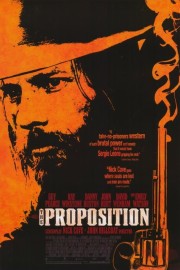The Proposition
Get ready to start hearing a lot about Australian director John Hillcoat. His adaptation of the Cormac McCarthy novel “The Road” is a likely Oscar contender come October, despite seeing its’ release pushed back a year.
Do yourself a favor- in the next four months, catch up with his 2006 Outback Western “The Proposition,” and prepare to see his buzz skyrocket. He’s the real deal- so is his movie.
Genres never really die. Sometimes they’re just waiting for a filmmaker who can make them feel alive again. With the advent of Bond and the modern action movie in the ’60s, Westerns felt out of touch with the times. Since then, however, some filmmakers have managed to make them feel alive and important to moviegoers, starting with Kevin Costner and Clint Eastwood with their Oscar-winning “Dances With Wolves” and “Unforgiven,” respectively, as well as “Tombstone.” The past couple of years, films like “Appalooza” and “3:10 to Yuma” have shown that there’s still some viability in the genre.
But by setting their film in the Australian Outback at the tail end of the 19th Century, Hillcoat and screenwriter Nick Cave (the musician who also collaborated on the evocative score with Warren Ellis) achieve the same freshness that resonated throughout Sergio Leone’s classic Italian westerns with Eastwood. It also shows us a society where criminals sometimes are more righteous than the good citizens (David Wenham’s properly-attired lawman is an unforgiving ideologue with less dignity than you might think), and a lawman will stake his reputation on the word of a murderer.
The lawman is Captain Stanley (Ray Winstone), a gruff Wyatt Earp-type sheriff with a lovely wife (Emily Watson) and a dilemma on his hands. He’s captured two of the three brothers of the infamously brutal Burns gang- Charles (Guy Pearce) and Mike (Richard Wilson)- which is responsible for the rape and murder of a pregnant woman in town. Little Mike is slated to be hanged on Christmas, but could receive a stay if Charles heads out into the Outback to bring in his sociopathic older brother Arthur (Danny Huston, in a portrait of unsympathetic villainy that rivals Hannibal Lecter). Stanley is betting his reputation on the word of a scoundrel, but that doesn’t explain why Charles would have taken Mike away from their brother for his protection.
Almost to a film, the films mentioned above- like several others before them- pose fascinating questions of morality to its’ characters, and sometimes ask the viewer to view villains with the same sympathetic eye we give towards heroes. “The Proposition” is no different, with its’ gritty style and unforgiving landscape upping the ante above any Western since “Unforgiven.” Most compelling in the film is how several of the characters in the film operate in the gray areas between good and evil, each with their own endgame they’re looking to accomplish.
This gray area is on display most vividly in the middle of the movie, when Wenham’s character orders Mike Burns flogged 100 times. Stanley relents only after his wife appeals to his feelings for her (what if it’d been her?), but that doesn’t make the brutal spectacle any easier to watch. The pain in Mike’s screams- he’s the youngest and most sympathetic of the Burns brothers- and the winces on Watson’s face as she watches the event burn into your memory. Here we see a typical Western archetype in which good and evil are turned around to give us a glimpse at the moral ambiguities of the era.
All of the actors shine. Winstone shows a clarity in his sheriff’s thought process that doesn’t give in to “frontier justice” so much as reason through simple right and wrong logic. In his own way, he’s a lot like the lawmen at the heart of films like “Tombstone” and “Appalooza,” but with the ambiguity of the vigilante of Eastwood’s “Unforgiven.” Pearce is at his steely, certain peak as Charles. Even when we see him commiserate with the sadistic Arthur, or in a scene with an old man in a bar (John Hurt, whose speech about Darwin and natural selection gets to the savage soul in this bloody and brilliant film), we still carry with us the knowledge of his love for his brother Mike. Meanwhile, Watson provides a warm center to a film that otherwise might be relentless in its’ harsh look at a world that, in some ways, still exists, what with good sometime going to morally-questionable lengths to punish evil.










